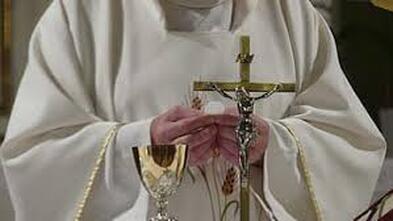The Sacrament of Order (CIC 1536-1589).
Thanks to this Sacrament, Christ’s mission to his Apostles continues to be exercised in the Church until the end of time. This is composed of the sacred orders of: episcopate, presbytery and diaconate. Order means designate to a special function. It is not a mere public function, the candidate through the gift of the Holy Spirit, conferred on him to be able to exercise with a sacred power, power that comes from Christ, as One and Eternal Priest, Mediator between God and men. Although all the baptized faithful are also part of that common priesthood of Christ to be exercised in the vocation of Each one, there is also the Ministerial Priesthood: Bishop, Priest, and Deacon, who represent Christ, but it is the priesthood of Christ that acts in those who ask for the sacrament. The Bishop in great respect for the Apostolic Succession is consecrated to sanctify, teach and govern. Priests, as collaborators of the Bishop in their roles towards the people, representing Christ. The Deacon on your order is called to perform a service.
The sacred Order in Men is very broadly in the Bible, but in a special way the Church preserves this mission entrusted to Peter and the other Apostles and calls it Apostolic Succession (Mt 16:13-20; 19, 11-12; Jn 20, 19-23).
Thanks to this Sacrament, Christ’s mission to his Apostles continues to be exercised in the Church until the end of time. This is composed of the sacred orders of: episcopate, presbytery and diaconate. Order means designate to a special function. It is not a mere public function, the candidate through the gift of the Holy Spirit, conferred on him to be able to exercise with a sacred power, power that comes from Christ, as One and Eternal Priest, Mediator between God and men. Although all the baptized faithful are also part of that common priesthood of Christ to be exercised in the vocation of Each one, there is also the Ministerial Priesthood: Bishop, Priest, and Deacon, who represent Christ, but it is the priesthood of Christ that acts in those who ask for the sacrament. The Bishop in great respect for the Apostolic Succession is consecrated to sanctify, teach and govern. Priests, as collaborators of the Bishop in their roles towards the people, representing Christ. The Deacon on your order is called to perform a service.
The sacred Order in Men is very broadly in the Bible, but in a special way the Church preserves this mission entrusted to Peter and the other Apostles and calls it Apostolic Succession (Mt 16:13-20; 19, 11-12; Jn 20, 19-23).
El Sacramento del Orden (CIC 1536-1589).
Gracias a este Sacramento la misión confiada por Cristo a sus Apóstoles sigue siendo ejercida en la Iglesia hasta el fin de los tiempos. Este está compuesto por las órdenes sagradas de: episcopado, presbiterado y diaconado. Orden significa la designación a una función especial. No es una mera función pública, el candidato mediante el don del Espíritu Santo, le confiere poder ejercer con un poder sagrado, poder que le viene de Cristo, como Único y Eterno Sacerdote, Mediador entre Dios y los hombres. Aunque todos los fieles bautizados también forman parte de ese sacerdocio común de Cristo para ser ejercido en la vocación de Cada quien, está también el Sacerdocio ministerial: Obispo, Sacerdote y Diácono, quienes representan a Cristo, pero es el sacerdocio de Cristo el que actúa en los que piden el sacramento. El Obispo en gran respeto a la sucesión Apostólica es consagrado para santificar, enseñar y gobernar. Los sacerdotes, como colaboradores del Obispo en sus funciones hacia el pueblo, representando a Cristo. El Diácono por su orden está llamado a ejercer un servicio.
El sagrado Orden en los hombres, está muy ampliamente en la Biblia, pero de manera especial la Iglesia preserva esa misión confiada a Pedro y los demás Apóstoles y le llama sucesión Apostólica (Mt 16, 13-20; 19, 11-12; Jn 20, 19-23)
Gracias a este Sacramento la misión confiada por Cristo a sus Apóstoles sigue siendo ejercida en la Iglesia hasta el fin de los tiempos. Este está compuesto por las órdenes sagradas de: episcopado, presbiterado y diaconado. Orden significa la designación a una función especial. No es una mera función pública, el candidato mediante el don del Espíritu Santo, le confiere poder ejercer con un poder sagrado, poder que le viene de Cristo, como Único y Eterno Sacerdote, Mediador entre Dios y los hombres. Aunque todos los fieles bautizados también forman parte de ese sacerdocio común de Cristo para ser ejercido en la vocación de Cada quien, está también el Sacerdocio ministerial: Obispo, Sacerdote y Diácono, quienes representan a Cristo, pero es el sacerdocio de Cristo el que actúa en los que piden el sacramento. El Obispo en gran respeto a la sucesión Apostólica es consagrado para santificar, enseñar y gobernar. Los sacerdotes, como colaboradores del Obispo en sus funciones hacia el pueblo, representando a Cristo. El Diácono por su orden está llamado a ejercer un servicio.
El sagrado Orden en los hombres, está muy ampliamente en la Biblia, pero de manera especial la Iglesia preserva esa misión confiada a Pedro y los demás Apóstoles y le llama sucesión Apostólica (Mt 16, 13-20; 19, 11-12; Jn 20, 19-23)
citation:
Conference of Catholic Bishops. Catechism of the Catholic Church (2nd Edition, English Translation). Libreria Editrice Vaticana, 1994.
Conference of Catholic Bishops. Catechism of the Catholic Church (2nd Edition, English Translation). Libreria Editrice Vaticana, 1994.

